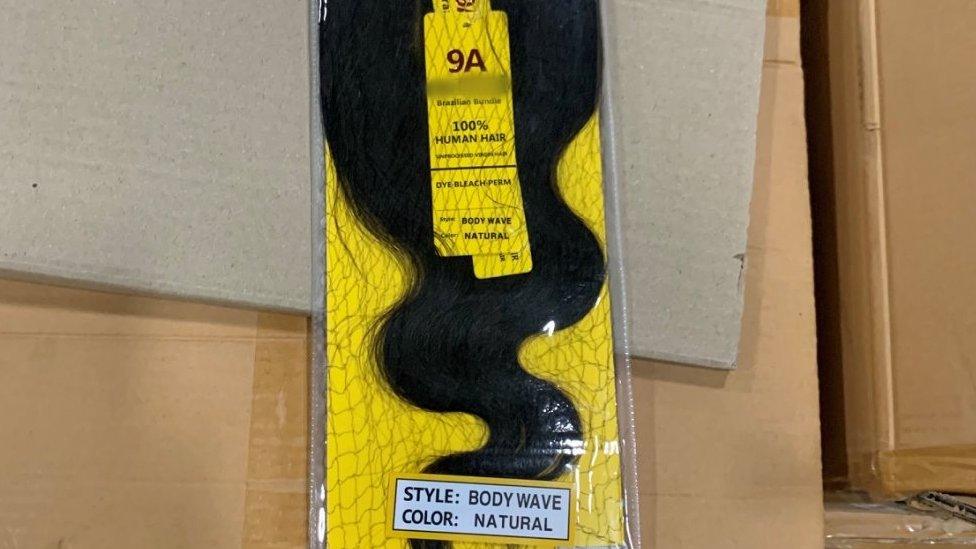Xinjiang: US seizes 'forced labour' Chinese hair imports
- Published

One of the products seized in the US
The US has seized a shipment of human hair products from China, that it says was made by forced labour from children or prisoners.
The products came from Xinjiang in the far west of China - where it's thought a million Muslims have been detained in "re-education" camps.
"Production of these goods constitutes a very serious human rights violation," said US customs official Brenda Smith.
China said the "forced labour" accusation was false and malicious.
The US did not say whether the hair itself came from children or prisoners - merely that the products were made by them.
What was seized?
The products were detained by the US Customs and Border Protection at the Port of New York and New Jersey.
The goods came from a company in Xinjiang, which, the agency said, indicated "potential human right abuses of forced child labour and imprisonment".
The products were part of 13-ton shipment of hair products worth more than $800,000 dollars.
The BBC visits the camps where China’s Muslims have their "thoughts transformed"
Last month, the agency issued a "detention order", external for all products from the Lop County Meixin Hair Product Company in Xinjiang.
A long-standing US law bans the importation, external of any products made by "convict labour" overseas.
"The detention order is intended to send a clear and direct message...that illicit and inhumane practices will not be tolerated in US supply chains," said Ms Smith.
The Chinese embassy in the US told Reuters: "The lawful labour rights and interests of the Chinese citizens of all ethnic groups, including those in Xinjiang, are protected by law."
What else is the US doing about Xinjiang?
In October last year, the US imposed visa restrictions , externalon Chinese officials "believed to be responsible for, or complicit in, the detention or abuse of...Muslim minority groups in Xinjiang".
The Department of Commerce has warned Americans against doing business with 37 companies in Xinjiang, external, that it suspects of "forced labour and other human rights abuses".
And last month, President Trump signed the "Uyghur Human Rights Act", external into law, which allows for sanctions and increases US agencies' reporting on Xinjiang.
The BBC has found new evidence of the increasing control and suppression of Islam in China
But Mr Trump recently said he held off on stronger sanctions because "we were in the middle of a major trade deal" with China.
"When you're in the middle of a negotiation and then all of a sudden you start throwing additional sanctions on... we've done a lot," Mr Trump told Axios.
What is the situation in Xinjiang?
China says the detention camps are to counter extremism - but the US, and others, believe more than a million people, almost all Muslims, have been detained without trial.
Last year, the BBC saw leaked documents that showed 15,000 people from southern Xinjiang were sent to the camps in one week alone.
The same documents showed inmates can be released only when they "understand deeply the illegal, criminal and dangerous nature of their past activity".
"An electric baton to the back of the head" - a former inmate described conditions at a secret camp to the BBC
Ben Emmerson QC, a human rights lawyer and adviser to the World Uighur Congress, said the camps were "a mass brainwashing scheme".
"It's a total transformation that is designed specifically to wipe the Muslim Uighurs of Xinjiang as a separate cultural group off the face of the Earth," he said.
A year ago, the BBC found that China was separating Muslim children from their families, faith and language.
In one township alone, more than 400 children lost both parents to internment - either the "re-education" camps or prison.
And earlier this week, a report by a scholar of China said women were being sterilised or fitted with contraceptive devices to limit the Muslim population.

More about the treatment of Muslims in Xinjiang:
Many Uighurs living in the London and the UK have been cut off from their families